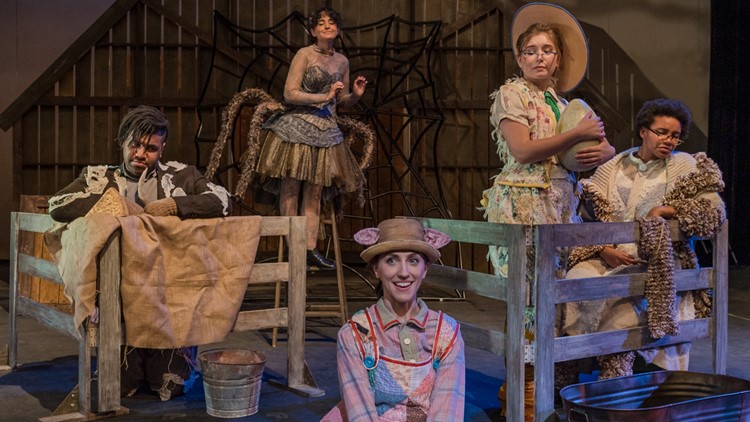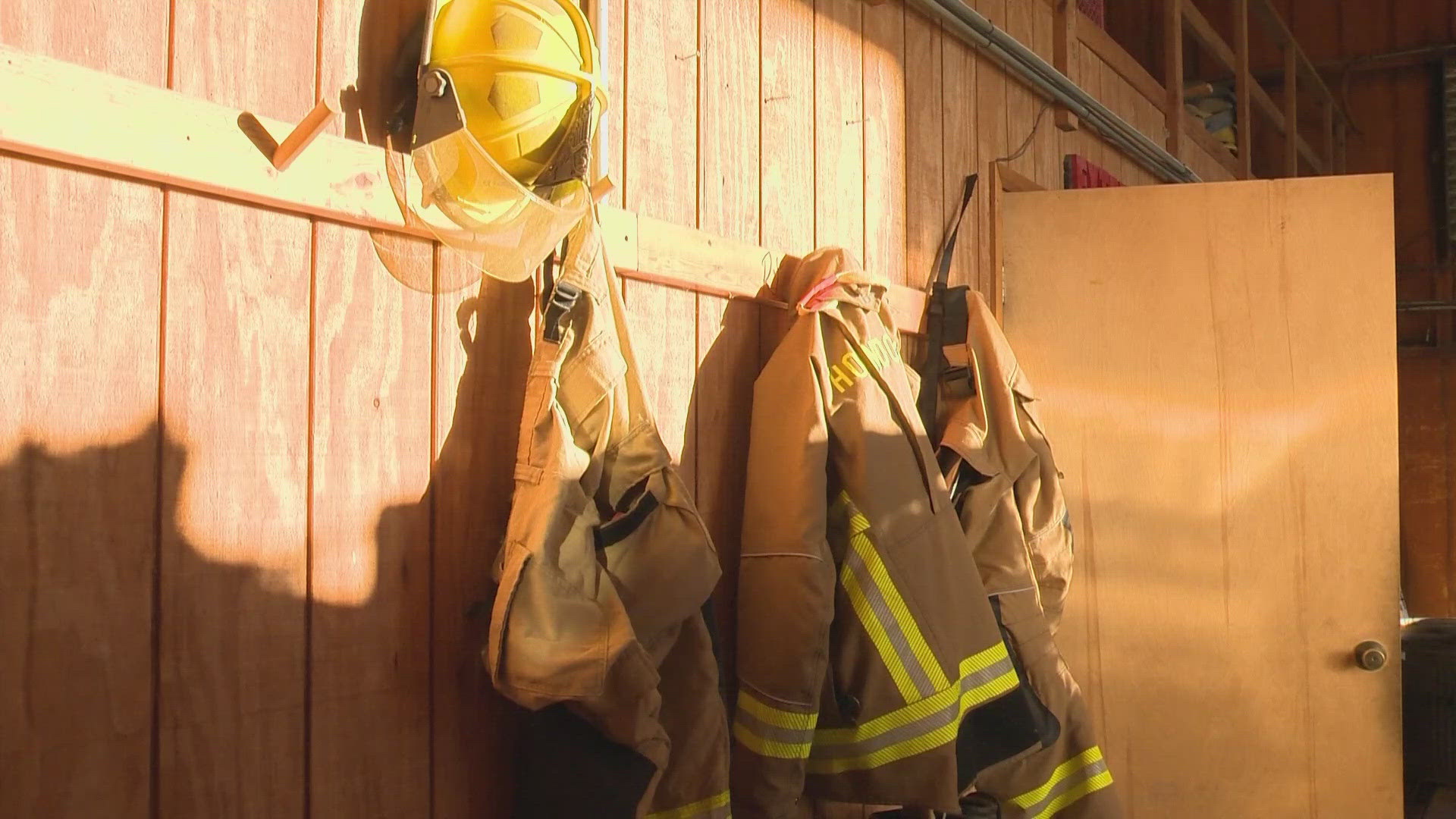SAN ANTONIO — On Sunday afternoon, the performers at downtown San Antonio’s Magik Theatre put on their costumes – a pig’s pink ears, a spider’s spindly legs among them – but they may have been more excited about what they were leaving off.
Last weekend, for the first time since COVID-19 vaccine distribution began, Magik's actors were performing in front of a live audience for a production of “Charlotte’s Web.” And for the first time in well over a year, they were performing without masks.
“I am very, very excited,” said Rosa Gardner, a regular actress at Magik who fills the shoes (er, hooves) of Wilbur in this run of “Charlotte’s Web” shows, slated to go through July 3. “I’m probably going to cry the second they react to anything.”
After all, it was just a few days before the production officially hit the stage that the decision was made to go maskless for it, thanks in part to every member of the cast being fully vaccinated. In a time when San Antonians have been able to cautiously mark certain milestones at their own pace en route out of a life of social distancing – vaccination, leaving the mask at home, eating at indoor restaurants, hugging a loved one instead of just chatting over Zoom – Gardner had an apt word for that de-masking moment in one of Magik’s final “Charlotte’s Web” rehearsals.
“It felt like graduation. We ripped off our masks [and] it was the weirdest thing; we had the giggles all through rehearsal because we were just like, ‘Your face! I haven’t seen your face in over a year and a half!’ she said. “It was so funny, [but] it was very vulnerable. I kind of missed it for a second because I felt like, ‘Wow, I feel very exposed.’”
Not that Magik has had a total lack of exposure during the coronavirus pandemic. When normality was upended in early 2020, the theater was in the middle of student camps and preparing student productions—and while some of those initiatives were halted for a few weeks, Magik, much like everyone else, also learned to adapt. Summer student academies turned virtual, masks came on for limited-capacity shows, and, for the first time, the theater dipped its toes into live-streaming a handful of productions.
In other words, Magik reiterated and readjusted to continue its mission of serving the community and its youth. Darcell Bios, director of “Charlotte’s Web” and an educator at the theatre, likened their efforts to trauma response during a most uncertain moment.
“With kids being forced to lose that social interaction, we know that part of what the teacher is helping kids learn is to express themselves,” he said. “They need to have some sort of interaction with other students, even if it’s virtual. As a whole, we understand – in working with kids for so long – how important theater is and what it does for the kids.”
As the staff at Magik puts it, the pandemic provided an opportunity to reorient themselves around their objectives as a family theatre that has served the city for nearly three decades. It was never a consideration to shut down the box office and lock the doors for the rest of 2020, but Artistic Director Anthony Runfola says what was normal practice before had to be reevaluated.
“As we move forward, what has been typical for Magik, whether it’s programming or attendance, all of that is off the table—how things work, what people expect,” Runfola said. “I think it’s all kind of thrown out. We acknowledge it, but moving forward we’re just moving into a different world now.”
For Runfola, the pandemic was merely the latest readjustment in a matter of months; he had just been hired as artistic director in the fall of 2019 and wasn’t in the Alamo City full-time until New Year’s Day of what would end up being a more challenging year than anyone could have expected.
While not having the usual production schedule allowed him and the rest of the staff to connect on levels they may otherwise not have, it also meant Runfola couldn’t rely on the regular practices and “old tricks” he’d acquired over several years of working in the theater industry, most recently at Childsplay, based in Arizona. Instead, the pandemic provided Magik’s artists with the impetus for experimentation by filming some shows – “Dragons Love Tacos” and “Señora Tortuga” among them – and making them available online, widening their accessibility and exposure to families who could watch from the safety of their homes.
Plus, it allowed Magik’s staff to dabble in a different medium and widen their own skillset. It's an option they plan to continue offering in the future.
“I am very excited about that because I always thought that video and the sort of playback idea can really complement what you’re seeing onstage. As an artist, as a director, it’s also sort of interesting to think about how you tell the story visually through the screen as well as through the theater,” Runfola said. “I think they become these two sort of separate halves of the same work of art, just viewed in different ways.”
That newfound space for creativity was just as important for Magik staff on an individual level when the theatre was forced to furlough some employees. Bios said the filming of those shows manifested opportunities to combine old skills with new ones. In Gardner’s case, the spring schedule being put on hold motivated her to pursue other artistic endeavors, to “connect with art in a whole new way.”
Once it returned to holding in-person shows while exercising the necessary pandemic-era precautions, Magik would also eventually take some of those productions elsewhere in town, like the San Antonio Botanical Garden. Performing in front of an audience, even one that was socially distanced, meant the performers masked up—leading to artistic challenges for actors. How do you manifest the in-person energy and expression that’s so key to theater when audiences can’t see half of your face?
Gardner, who acted in Magik’s two-person production of “Snow White” at the end of last year, said the obstacle wasn’t entirely new thanks to a college course she took called – what else? – “Character Mask.”
“A lot of what we’d studied in that was to cover up either our entire face or parts of our face and see what we could communicate in other ways,” she said. “It was really kind of cool. It was less like, ‘Oh, I can’t do this,’ and more, ‘OK, let’s do a character mask exercise with this show.’ While I prefer not having a mask on, I was able to have a nice time doing it and finding things I probably wouldn’t have discovered had I not been forced to look at it in a new way.”
Turns out, there was a lot of that looking-at-things-in-new-ways happening at Magik, in regards to the ins and outs of production design and costuming; to the necessary changes to keep in-person audiences safe at shows; even to the current production of “Charlotte’s Web” itself, which was originally scheduled for 2020 with a different cast and crew. Bios hopped on as director in January as preparations revved back to life, and Gardner joined a cast she wasn’t a part of before.
In Runfola’s eyes, the merits of returning to the stage unmasked in front of an audience run a little deeper than a revamped show. There's some symbolism, he says, in a story about selflessness arriving after a year when we've all had to learn to be a bit more selfless. It also proves how a familiar piece of art can still resonate in new ways.
“As we worked through it and I watched rehearsals, you realize how much grieving there actually is in that play. Especially for young people, it’s very, very honest in its expression of life,” he said. “When you get to the end of the state fair in ‘Charlotte’s Web’ and Wilbur is saved and he’s won his prize, but Charlotte has sort of sacrificed her life so she can live, I kind of suddenly felt like, ‘Oh, we’re moving into this time that really feels good. But I think just on the other side of that we’re going to start to realize what we’ve lost in that time.'"
At the same time, Bios said the cast’s decision to take off the masks represents something vital for children in the audience, most of whom are still waiting to get immunized. (Families who check out "Charlotte's Web" are still being asked to adhere to mask-wearing policies unless they're eating concessions, and can expect to have their temperature taken at the door.)
“I think not having the memory of ‘Charlotte’s Web’ at the Magik be a reflection of the pandemic so much...I think that provides hope for kids, that we won’t be wearing masks forever,” Bios said. “It allows them to do what theater does, which is escape from the realities of the world and dive into a world where things are good.
And for as much as working on new productions has emphasized the importance of community engagement in the arts, for the staff at Magik, the hurdles of the last year have also underscored the theatre’s role in guiding local families and children to that intersection—and to the possibilities and imagination they can find there, even when possibility is ostensibly limited.
“That’s why I say I don’t really want to go back to normal,” Runfola said. “I want us to really, together as an organization, figure out why we’re important, who we are, what’s important to the organization, how we serve the community, how and where we serve the community...and put all of that at the center of what we do.”



